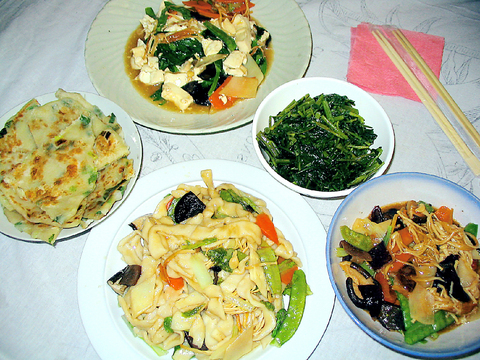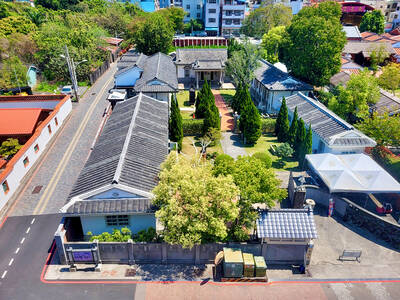There's no English name to this restaurant, so I've always called it the "Northern place on the corner," since it is just a few meters from the intersection of Tianmu North and Tianmu West Roads and serves Northern Chinese-style food.
But it is easily identifiable by the large, open-kitchen area that faces the street, where a team churns out a never-ending flow of dumplings, spring onion pancakes, guotie (
As you as you walk in the door, take a look at the display case of "small dish" appetizers. They run the usual gamut of cold tofu noodles, Korean vegetables, pickled cucumber or bamboo, eggplant and bitter winter greens. Make your selection and a waitress will take them to your table.

PHOTO DIANE BAKER, TAIPEI TIMES
The rather extensive menu starts off with a page labeled "Pastries and Noodles," offering a selection of spring onion cakes, beef cakes, dumplings, shredded bread, fried noodle dishes and porridges. The "Hot Fried" and "Soft Fried" page lists a selection of shredded pork, beef, chicken and intestines dishes, while the "Seafood" pages offer a wide variety of marine life, including several shrimp dishes, as well as carp, pomfret, yellowfish, sea slug and cuttlefish cooked several different ways.
There are also some hot pot and tepanyaki options, a few basic soups, rice dishes and a page of vegetable dishes.
One of the reasons that I have always liked this place is that it offers various vegetable and tofu dishes for vegetarians, such as bean curd tepanyaki and spicy tofu, but also has plenty of variety to keep my meat-eating friends happy.
On a recent visit, the fried vegetables, braised tofu, fried noodles and kongxincai (
The fact that the restaurant has been in business at the same location for well over two decades and there is always a line waiting to get in at dinnertime and on weekends means the eatery is doing something right. Nothing too fancy, just good basic dishes at reasonable prices, served quickly, that will leave any diner satisfied.

In the March 9 edition of the Taipei Times a piece by Ninon Godefroy ran with the headine “The quiet, gentle rhythm of Taiwan.” It started with the line “Taiwan is a small, humble place. There is no Eiffel Tower, no pyramids — no singular attraction that draws the world’s attention.” I laughed out loud at that. This was out of no disrespect for the author or the piece, which made some interesting analogies and good points about how both Din Tai Fung’s and Taiwan Semiconductor Manufacturing Co’s (TSMC, 台積電) meticulous attention to detail and quality are not quite up to

Chinese Nationalist Party (KMT) Chairman Eric Chu (朱立倫) hatched a bold plan to charge forward and seize the initiative when he held a protest in front of the Taipei City Prosecutors’ Office. Though risky, because illegal, its success would help tackle at least six problems facing both himself and the KMT. What he did not see coming was Taipei Mayor Chiang Wan-an (將萬安) tripping him up out of the gate. In spite of Chu being the most consequential and successful KMT chairman since the early 2010s — arguably saving the party from financial ruin and restoring its electoral viability —

It is one of the more remarkable facts of Taiwan history that it was never occupied or claimed by any of the numerous kingdoms of southern China — Han or otherwise — that lay just across the water from it. None of their brilliant ministers ever discovered that Taiwan was a “core interest” of the state whose annexation was “inevitable.” As Paul Kua notes in an excellent monograph laying out how the Portuguese gave Taiwan the name “Formosa,” the first Europeans to express an interest in occupying Taiwan were the Spanish. Tonio Andrade in his seminal work, How Taiwan Became Chinese,

Toward the outside edge of Taichung City, in Wufeng District (霧峰去), sits a sprawling collection of single-story buildings with tiled roofs belonging to the Wufeng Lin (霧峰林家) family, who rose to prominence through success in military, commercial, and artistic endeavors in the 19th century. Most of these buildings have brick walls and tiled roofs in the traditional reddish-brown color, but in the middle is one incongruous property with bright white walls and a black tiled roof: Yipu Garden (頤圃). Purists may scoff at the Japanese-style exterior and its radical departure from the Fujianese architectural style of the surrounding buildings. However, the property